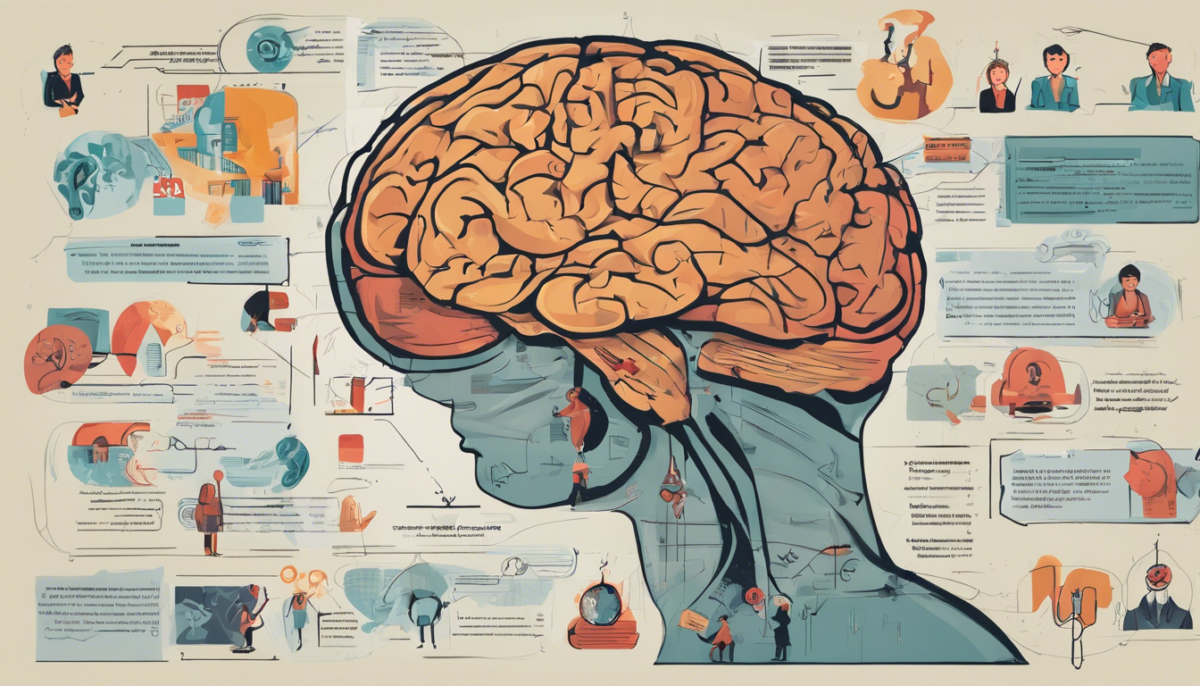» Common Mental Health Disorders
Strategies and Reasons Behind Overthinking
Introduction
Overthinking is a mental pattern distinct from problem-solving and self-reflection, involving dwelling on possibilities and pitfalls without intent to solve a problem or grow as a person [1].
Signs of overthinking include dwelling on past events, second-guessing decisions, replaying mistakes, rehashing uncomfortable conversations, fixating on things you can’t control, imagining worst-case scenarios, and inability to make decisions or take action [1] [3].
Overthinking can trigger mental health problems like depression and anxiety by dwelling on past mistakes, problems, and shortcomings [2], and negatively impact mental and physical health, leading to anxiety, depression, fatigue, headaches, nausea, trouble concentrating, and sleep/appetite changes [1].
It often involves focusing on the negative – rehashing the past, dwelling on bad experiences, or worrying about the future [4], making it difficult to accept intrusive thoughts and maintain good mental health due to rumination [1] [3] [4].
Understanding Overthinking
Overthinking is distinct from problem-solving and self-reflection, as it involves dwelling on possibilities and pitfalls without the intent to solve a problem [1]. It is characterized by several signs, including:
- Dwelling on past events, second-guessing decisions, and replaying mistakes [1]
- Rehashing uncomfortable conversations and fixating on things beyond one’s control [1]
- Imagining worst-case scenarios and experiencing repetitive, ruminating thoughts [1] [3]
Overthinking is not a recognized mental health condition itself, but it can be a symptom of depression or anxiety disorders, particularly generalized anxiety disorder (GAD) [5].
It interferes with problem-solving ability by causing individuals to dwell on the problem rather than taking action [2], and disrupts sleep by constantly ruminating on matters beyond their control [2].

At its core, overthinking is not about the specific thoughts themselves, but rather the anxiety and stress that cause obsessive thought patterns [6]. The root cause is often anxiety, which can stem from a combination of factors such as genetics, environment, and how individuals interpret and react to stressful situations [6].
Overthinking becomes a habitual, automatic self-protection mechanism over time, as the brain tries to feel in control of real-life issues like finances, health, and relationships [7].
Negative Effects of Overthinking
Overthinking can have severe negative effects on an individual’s mental and physical well-being [1] [4]. It is often associated with mental health conditions like depression, anxiety, PTSD, and borderline personality disorder [4]. Some of the major negative impacts include:
- Mental Health Issues: Overthink can lead to anxiety and depression, which come with symptoms like fatigue, headaches, nausea, trouble concentrating, and sleep/appetite changes [1]. Anxiety is linked to high blood pressure and poor cardiovascular health, while depression increases the risk of heart attack and suicide [1].
- Impaired Problem-Solving: Dwelling interferes with problem-solving ability by causing people to dwell on problems and imagine worst-case scenarios rather than finding solutions [2].
- Sleep Disruption: The constant worrying and rumination associated with mulling over makes it difficult to fall asleep and get quality sleep [2].
- Relationship Strain: Overanalyzing can contribute to relationship issues, leading to relationship anxiety and attempts to control others [3].
- Physical Health Problems: In addition to mental health issues, it can also lead to physical health problems like headaches, body aches, and stomach problems [4].
Ultimately, overthink can have far-reaching consequences, affecting an individual’s mental, physical, psychological, and social well-being [6]. It becomes a problem when it starts to interfere with everyday life, causing trouble sleeping, impacting appetite, or leading to social isolation [4].

Types of Overthinking Patterns
There are several distinct patterns of overthinking that individuals may experience [3] :
- All-or-Nothing Thinking: This involves seeing situations in black-and-white terms, with no shades of grey [9]. It leads to overgeneralization, where one negative event is believed to be a never-ending pattern [9].
- Catastrophizing: This involves magnifying or blowing things out of proportion, often by jumping to conclusions without evidence [9]. It includes mindreading (assuming what others think about you) and fortune-telling (predicting the future negatively) [9].
- Rumination: This involves dwelling excessively on past negative events, experiences, mistakes, and regrets [10] [11]. It’s characterized by ‘woulda, shoulda, coulda’ scenarios and feelings of guilt [11].
- Future Tripping: This pattern involves excessive worrying and planning for potential future scenarios, driven by uncertainty and fear of the unknown [10] [11]. It includes hopeless thoughts about the future and one’s circumstances [10].
- Overanalyzing: In this pattern, individuals dive deep into details and overthink decisions to the point of paralysis and procrastination [10] [11]. It can involve indecisiveness, getting hung up on simple choices [10].
- Mental Chatter: This refers to constant, trivial thoughts that won’t stop, creating a sense of mental noise and clutter [10].
- Negative Self-Talk: This involves worthless thoughts about oneself, negative self-labeling, and personalization (blaming oneself for things outside one’s control) [9] [10].
These patterns often overlap and reinforce each other, creating a vicious cycle of overthink that can be challenging to break free from [3] [8] [9] [10] [11].

Strategies to Stop Overthinking
There are several effective strategies to help overcome the overanalyzing habit and regain control over your thoughts:
Cognitive Behavioral Therapy (CBT) and Mindfulness Techniques
- CBT helps identify and challenge negative thought patterns, teaching you to distinguish between productive and unproductive worry [10]. It involves making action plans for worries within your control and letting go of those beyond your influence [10].
- Mindfulness practices like meditation, deep breathing exercises, and staying present in the moment can prevent the mind from wandering into overthinking [10] [12] [13].
- Visualize intrusive thoughts as separate from yourself, like balloons floating away, to achieve thought defusion [10].
Practical Tips and Lifestyle Changes
- Set aside dedicated “worry time” each day to contain rumination within a specific window [11] [14].
- Reframe “what if” worries into “if-then” statements with concrete action plans [14].
- Pursue hobbies, physical exercise, or other enjoyable activities to distract yourself [12] [15].
- Practice self-compassion, gratitude, and challenge negative self-talk [9] [12] [14].
- Limit information intake, unplug from devices, and avoid triggers that escalate anxiety [11] [15].
Cognitive Restructuring Techniques
- Keep a thought journal to identify cognitive distortions like catastrophizing or all-or-nothing thinking [9].
- Question the validity of your thoughts and consider alternative perspectives [9] [12].
- Adopt a “good enough” mindset instead of striving for perfection to overcome procrastination [8].
- Use “temporal distancing” by mentally projecting yourself into the future to gain perspective on current worries [11].
If the Obsessing persists and interferes with daily functioning, seeking professional support from a therapist is recommended to develop personalized coping strategies [5] [12] [14].
Conclusion
In summary, overthink is a pervasive habit that can negatively impact mental and physical well-being. It manifests in various patterns, such as rumination, catastrophizing, and negative self-talk, often reinforcing a vicious cycle of worry and anxiety.
By understanding the root causes and adopting strategies like cognitive-behavioral therapy, mindfulness practices, and practical lifestyle changes, individuals can break free from the grip of pondering deeply and regain control over their thoughts.
While overcoming overthinking can be challenging, it is a worthwhile pursuit for improved psychological and emotional well-being. By cultivating self-awareness, practicing cognitive restructuring techniques, and seeking professional support when needed, individuals can learn to manage intrusive thoughts and redirect their mental energy towards more productive and fulfilling endeavors.

FAQs
What leads to overthinking and what are the steps to manage it?
Overanalyzing is usually a result of focusing too much on past errors or fretting over unchangeable circumstances. To manage it, practice self-acceptance and kindness towards yourself instead of criticizing past actions you regret.
How can I prevent my mind from overthinking?
To control the overthink, dissect the emotions you’re feeling and pinpoint the messages you’re giving yourself about the situation. Replace negative thoughts with more constructive ones, such as replacing “This is going to be an epic failure” with “I’m genuinely trying my best.”
What strategies can I use to cease overthinking?
Interrupt the obsessing by switching up your brain’s focus. This can be achieved by exercising, having a conversation on a different topic, or immersing yourself in a project that captures your attention, thereby halting the flow of negative thoughts.
What are the psychological factors that contribute to overthink?
Overanalyzing can be attributed to a lack of cognitive control, where some individuals struggle to suppress their thoughts, leading to persistent worry or rumination. Additionally, social and environmental factors can play a role in exacerbating obsessing tendencies.
References
[1] – https://www.houstonmethodist.org/blog/articles/2021/apr/when-overthinking-becomes-a-problem-and-what-you-can-do-about-it/
[2] – https://pharmeasy.in/blog/overthinking-to-what-extent-can-it-damage-your-life/
[3] – https://www.verywellmind.com/how-to-know-when-youre-overthinking-5077069
[4] – https://www.keranews.org/health-science-tech/2019-07-12/how-overthinking-can-affect-mental-and-physical-health
[5] – https://health.clevelandclinic.org/is-overthinking-a-mental-illness
[6] – https://ericsandroni.com/book-summary-stop-overthinking-by-nick-trenton/
[7] – https://www.berkeleywellbeing.com/overthinking.html
[8] – https://hbr.org/tip/2024/02/overcoming-overthinking
[9] – https://www.familycentre.org/news/post/10-common-negative-thinking-patterns-and-5-steps-for-change
[10] – https://thedepressionproject.com/blogs/news/the-9-different-types-of-overthinking
[11] – https://hbr.org/2024/02/3-types-of-overthinking-and-how-to-overcome-them
[12] – https://www.healthline.com/health/how-to-stop-overthinking
[13] – https://theawarenesscentre.com/seven-strategies-to-stop-overthinking/
[14] – https://health.clevelandclinic.org/how-to-stop-overthinking
[15] – https://www.quora.com/How-do-I-stop-overthinking-What-are-some-strategies-or-steps
[16] – https://www.amazon.com/Overcoming-Overthinking-Conquering-Sleeplessness-Transformation/dp/B0C1JJVBXF
[17] – https://www.amazon.com/Overcoming-Overthinking-Ways-Anxiety-School/dp/1947480820

